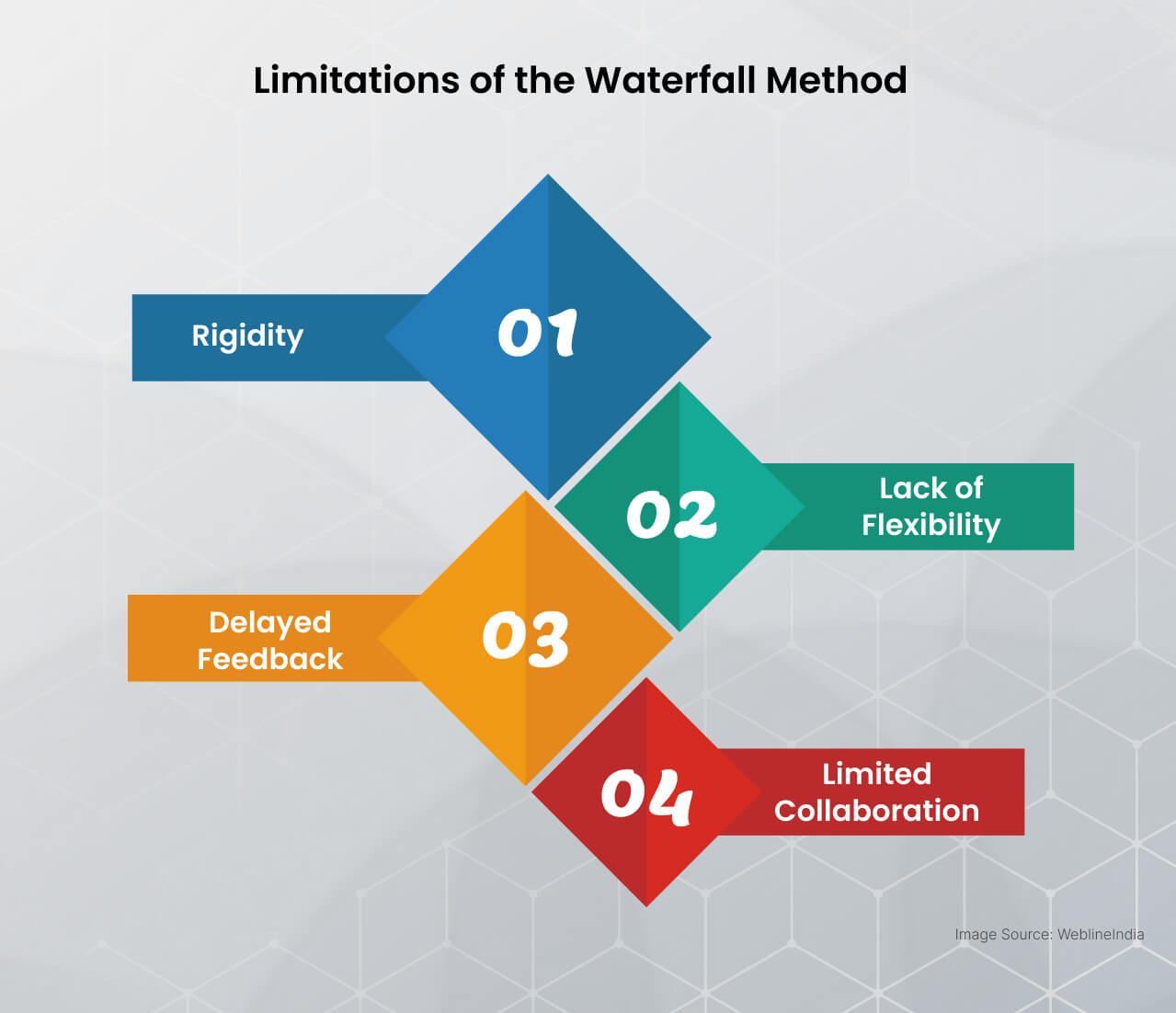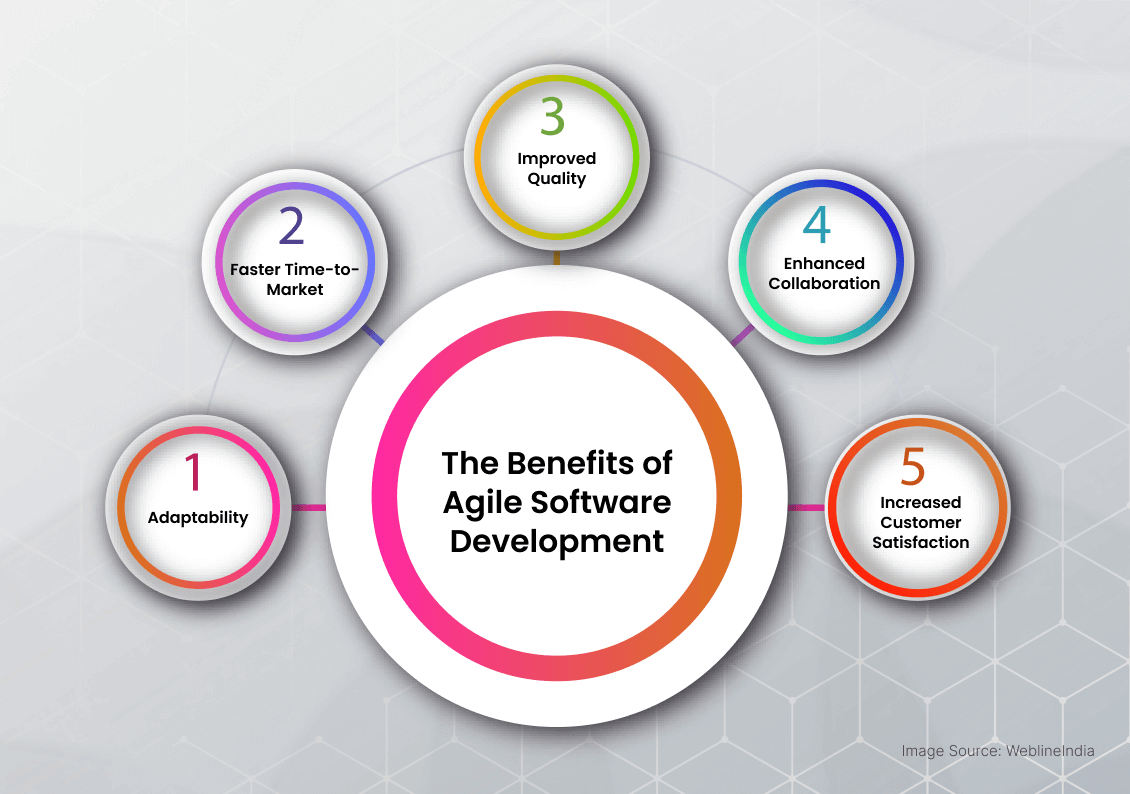The software development world is in constant flux, with methodologies for managing projects evolving at an equally rapid pace. There are more than 15 software development methods practiced by IT agencies; however, we’ll talk about the waterfall and agile for this specific topic. The once-dominant Waterfall method, with its rigid structure, is steadily giving way to more agile and iterative approaches. While Agile has brought much-needed flexibility, the future lies in embracing an even more adaptable approach – Adaptive Software Development.
This blog post explores the journey from Waterfall to Agile and delves into why adaptive methodologies are poised to revolutionize project management.
Struggling to meet software development project deadlines and client expectations?
The Waterfall Method
The Waterfall method is a rigid framework. It is characterized by its linear and sequential approach and was once the gold standard for software development. It divides projects into distinct phases, requirements gathering, design, implementation, testing, and deployment, each executed in a strict, predetermined order.
This structured approach can be effective for projects with clearly defined, unchanging requirements, but it often falters when faced with dynamic environments and evolving user needs.
Limitations of the Waterfall Method:

- Rigidity: Changes are difficult and costly to implement once a phase is completed, making it inflexible and unresponsive to changing needs.
- Lack of Flexibility: The Waterfall method struggles to adapt to evolving requirements or market conditions, potentially leading to outdated or irrelevant software.
- Delayed Feedback: Testing occurs late in the development cycle, increasing the risk of costly rework and project delays.
- Limited Collaboration: Communication between teams can be siloed, leading to misunderstandings, errors, and a longer development time.
The Agile Method
Agile emerged as a direct response to the limitations of Waterfall. The core philosophy of Agile is based on the Agile Manifesto, which emphasizes four key values:
- Individuals and interactions over processes and tools
- Working software over comprehensive documentation
- Customer collaboration over contract negotiation
- Responding to change over following a plan
Agile methodologies like Scrum and Kanban break down projects into smaller, more manageable sprints, allowing for greater flexibility and responsiveness to change.
The Benefits of Agile Software Development

- Adaptability: Agile methodologies are designed to respond effectively to changing requirements and market demands, ensuring the final product remains relevant.
- Faster Time-to-Market: Agile delivers working software in shorter iterations, enabling faster releases and quicker feedback cycles.
- Improved Quality: Continuous testing and feedback throughout the development process ensure higher quality products and reduce the risk of bugs.
- Enhanced Collaboration: Agile fosters communication and collaboration between development teams and stakeholders, leading to better alignment and improved outcomes.
- Increased Customer Satisfaction: Agile development places a strong emphasis on customer collaboration and satisfaction. Regular feedback from customers, stakeholders, and end-users ensures that the product aligns with their needs. Agile methodologies allow businesses to make adjustments based on this feedback, ensuring that the final product is of high quality and meets the customer’s expectations.
Are you dealing with constant delays and resource constraints in software development?
The Need for Adaptive Software Development
While Agile offers significant advantages over Waterfall, it is not a universal solution. In today’s rapidly changing technological landscape, even Agile can sometimes fall short. The need for greater adaptability has given rise to adaptive software development. This approach acknowledges that change is inevitable and encourages teams to embrace uncertainty, respond dynamically to new information, and continuously learn and improve.
Key Principles of Adaptive Software Development:
- Continuous Learning: Regularly reflect on processes and outcomes to identify areas for improvement and adapt strategies accordingly.
- Self-organization: Empower teams to make decisions and adapt their approach as needed, fostering ownership and accountability.
- Feature-Based Development: Prioritize features based on their value and risk, ensuring that the most important aspects are delivered first.
- Iterative and Incremental Delivery: Deliver working software in short cycles, allowing for frequent feedback and adaptation throughout the development process.
Why Adaptive Software Development is the Future?
In an era of digital disruption and constant innovation, adaptive software development is becoming increasingly crucial for success.
Here’s why:
- Increased Complexity: Modern software projects are becoming increasingly complex, requiring an adaptive approach to manage the inherent uncertainties.
- Rapid Technological Advancements: New technologies and frameworks emerge constantly, demanding adaptability to stay ahead of the curve.
- Evolving Customer Expectations: Customer needs and expectations are constantly changing, requiring software development to be flexible and responsive.
- Competitive Pressure: Businesses need to adapt quickly to market changes and competitive pressures to remain relevant and successful.
Adaptive software development enables organizations to navigate these challenges by:
- Promoting innovation and experimentation: It encourages teams to explore new ideas and solutions, fostering a culture of innovation.
- Reducing risk: By embracing change and adapting to new information, it minimizes the risk of project failure and costly rework.
- Improving time-to-market: Iterative development and continuous feedback enable faster delivery of valuable software.
- Enhancing customer satisfaction: By focusing on delivering value and responding to customer needs, it leads to higher customer satisfaction.
Why Choose WeblineIndia as Your Adaptive Software Development Partner?
As the demand for adaptive software development grows, finding the right partner to guide you through the process becomes crucial. WeblineIndia is an adaptive software development company with a proven track record of delivering innovative, high-quality solutions to businesses worldwide.
With years of experience in both Agile and traditional software development methodologies, WeblineIndia is well-equipped to handle all your IT project needs. Whether you’re looking to build a new application, update an existing one, or outsource software development services, we stand at the forefront with our RelyShore model. Our team of skilled developers and project managers works closely with clients to ensure that every project is executed according to adaptive plus agile principles, delivering maximum value and satisfaction.
Time To Avail Adaptive Software Development
The shift from Waterfall to Agile marks a significant change in the way software development projects are managed. Adaptive software development is the future of project management because it offers the flexibility, speed, and collaboration needed to succeed in a rapidly changing business environment.
For businesses looking to outsource software development, partnering with an adaptive software development company like WeblineIndia ensures that your projects are handled efficiently, with a focus on continuous improvement and customer satisfaction.
If you’re ready to embrace the future of project management, contact us now. With years of expertise and a deep commitment to delivering exceptional software solutions, WeblineIndia is the ideal partner for all your IT projects, both local and offshore.
Social Hashtags
#AgileDevelopment #SoftwareProjectManagement #AdaptiveDevelopment #AgileMethodology #WaterfallToAgile #ProjectManagementTrends
Worried about falling behind in today’s fast-paced market and need faster software delivery?
Testimonials: Hear It Straight From Our Customers
Our development processes delivers dynamic solutions to tackle business challenges, optimize costs, and drive digital transformation. Expert-backed solutions enhance client retention and online presence, with proven success stories highlighting real-world problem-solving through innovative applications. Our esteemed clients just experienced it.










